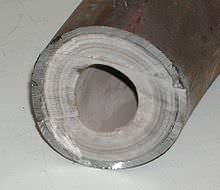Hard water contains a significant quantity of dissolved minerals, such as calcium and magnesium. In general, hard water is not harmful for health. In fact, it may confer some benefits because it is rich in minerals and reduces the solubility of potentially toxic metal ions such as lead and copper. However, there are some industrial applications where hard water may lead to inefficiencies or damage to containers and pipes. In such instances, water softening methods are used. When water is softened, metal cations are exchanged for sodium ions.
Comparison chart
Identification
The most common technique to determine the hardness of water is by looking at sud formation with soap. There is less lather formation when soap is used with hard water compared to soft water. Instead a white precipitate (soap scum) is produced. Another way in which water manifests its hardness is scaling i.e. forming deposits through calcification that clog plumbing. These scales are usually white because calcium and magnesium are the most common sources of hardness in water. In swimming pools, a cloudy or milky appearance characterizes hard water.
What causes hardness in water?
A high concentration of multivalent cations (i.e. charge greater than 1+) leads to hardness in the water. Calcium and magnesium ( Ca2+ and Mg2+) are the most common sources. Water usually collects these minerals from the ground as it flows. Rainwater and distilled water are soft.
Temporary vs Permanent Hardness of Water
Hardness that cannot be removed by boiling the water is called permanent hardness. Temporary water hardness is caused by the presence of bicarbonate minerals (calcium bicarbonate and magnesium bicarbonate). Boiling causes the formation of carbonate from the bicarbonate and precipitates it out, leaving soft water upon cooling. Permanent water hardness is usually caused by chlorides or calcium and magnesium sulfates. Note that permanent hardness is not really permanent in that it can also be softened (just not by boiling).
Hard and Soft Water Classification
A single-number scale cannot describe hardness of water accurately because the behavior of hardness depends upon a variety of factors such as minerals in the water, pH and temperature. The U.S. Geological Survey uses the following ranges of measurements to classify water into hard and soft water:
Effects of Hard Water
While hard water does not have an adverse effect on human health, it can leave spots and film on dishes and bathtubs and be more damaging to household appliances. It can leave deposits, called “scale,” that clog plumbing and impair the flow of heat in boilers, leading to overheating.

Drinking Water
Hard water is not considered to be dangerous to one's health, and it is perfectly healthy to drink. However, the minerals found in hard water can be detected in the taste, and so some people may find that it is slightly bitter, whereas soft water has a very pure, although occasionally very slightly salty taste. Some studies have shown that water hardness up to 170 mg/L can reduce the risk of cardiovascular disease in men but the WHO has reviewed the evidence and not found it to be conclusive and other studies have shown the correlation to be weak.[1]
Impact on hair and skin
Hair washed in hard water can feel sticky and look dull. Studies also suggest that hard water can cause an increase in eczema in children. This is because the minerals in hard water can dry out skin and hair. Hard water will cause treatments such as perms and dyes to fade faster and can cause a flaky scalp and hair breakage.
Soft water, however, can leave hair feeling oily and unclear, and hair washed in soft water has little volume.
Hard Water Treatment: How is water softened?
Hard water can be “softened” by reducing the concentration of calcium, magnesium and other minerals. Temporary hardness of water can be treated either by boiling it or by adding lime (calcium hydroxide). Permanent hardness of water can also be treated with ion-exchange resins in which hardness ions (Ca, Mg and other metallic cations) are exchanged for sodium ions. Chemicals such as (chelators) may also be used as water softeners. Citric acid is used in soap, shampoo, and laundry detergents to soften water.





 Mineral Water
Mineral Water  Tap Water
Tap Water  Minerals
Minerals  Diffusion and Osmosis
Diffusion and Osmosis Acid
Acid  Cool-mist
Cool-mist
Comments: Hard Water vs Soft Water
Anonymous comments (5)